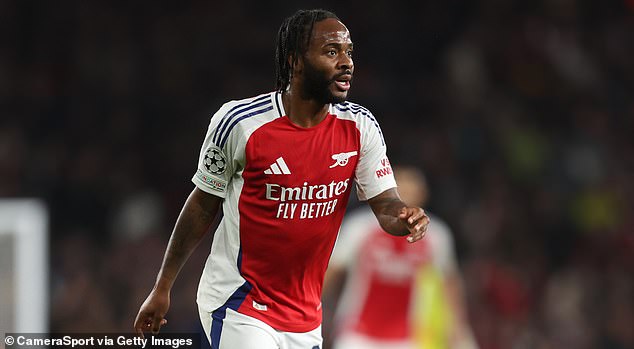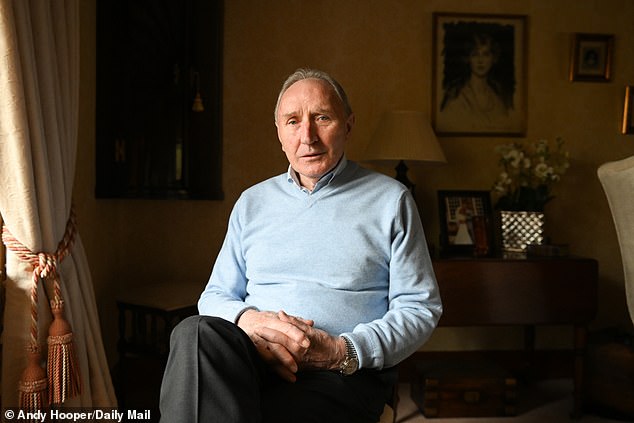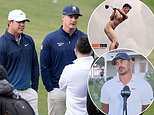Raheem Sterling's work with kids tempted by knife crime is so heartfelt because he was once a troubled teenager, writes IAN HERBERT
- The Arsenal star spoke to a group at risk of drifting into knife crime in London
- Join Mail+ to read Ian Herbert's unmissable column every Tuesday, plus more of your favourite writers, exclusive stories and in-depth sports reporting
The names Harry Pitman, Andre Salmon, Elianne Andam and Victor Lee might not mean much to you because we seem to have become immune to the way they all lost their lives.
They were aged 16, 18, 15 and 17 when they fell victim to knife crime and though Wednesday - World Children's Day - gives cause to assess once again how this scourge might be purged from our society, it feels like we've been here 100 times before.
It's often the mothers and sisters and aunts of a neighbourhood who lead the war against this threat to our children's safety. But the absence of an influential, guiding male presence in their lives is often at the root of the problem. At a meeting room in London's King Cross a few weeks back, a professional footballer filled that gap.
This wasn't one of those perennial football PR opportunities. The session was deadly serious because seven young men sent along by Brent's youth offending service to participate carried varying risks of drifting into knife crime. The individual sitting down with them for three hours was Raheem Sterling and after an initial 15 or 20 minutes when the boys seemed blinded by the superstar in their midst, his status gradually gave way to something more significant.
Sterling spoke to them in a way which made them see that he had once been someone just like them. An adolescent who knew what the wrong side of the lines looked like, in challenging early teenage years when he and his mother moved from house to house, and he was repeatedly excluded from school.
There were smiles among the boys as Sterling described the various school social groups back then. 'The cool group, the middle of the road group and the geeks.' The 'geeks' always seemed to be a bigger part of his world when exams approached, he said, with a grin.

Raheem Sterling last week sat down with seven young men sent along by Brent's youth offending service to participate carried varying risks of drifting into knife crime

Sterling has been open about his tough childhood and how he could have gone down the wrong path
But Sterling listened far more than he talked, comfortable with prolonged silences. As the group session evolved into several one-to-one conversations with the boys who'd been more reticent among the others, he pointed out the value of allowing outsiders – mentors - to help you, if your home life is challenging. That's a tricky message to deliver. Many children won't admit to the circumstances they are living with at home, for fear of negative implications for their parents. 'Having someone else involved changed the course of my life,' Sterling told them.
That 'someone' was Clive Ellington, a former motor trade manager who had started volunteering as a mentor to young boys in Brent when assigned to nine-year-old Sterling, who was on the fringes of the education system. Sterling's father had died early, and violently, and Sterling had been placed at a school with reduced class sizes and specialist help for children with emotional needs.
The one thing that seemed to bring the young Sterling out of himself - and make him smile - Ellington observed, was football, though he didn't play for a club. Ellington brought him to one he knew, Alpha and Omega FC, at Kingsbury, in Brent. A fateful intervention.
'Raheem didn't say very much but when he did talk, you could see the vulnerability and also potential,' Ellington tells me. 'The key to helping him was listening to him. We're very good at building support for children from where we want to be, but we don't take time to see what the child needs. He sees that now.'
The Sterling who was talking to the boys in Kings Cross is the one few know. The work of the foundation he has established in his own name funds knife banks, hosts mentoring sessions like the one with Brent boys and funds university places for boys like the one he once was. His own work for the foundation was one of many reasons why he flatly refused to accept Chelsea's attempts to sell him to Saudi Arabia this summer, opting for Mikel Arteta at Arsenal instead.
Sterling acknowledges Ellington's fundamental role in his life. 'He played a massive part in helping me see a different perspective,' he says. 'I was struggling because of circumstances at home - always being on the move - and I couldn't understand myself. As a child you're not understanding what's going on but at the same time taking in what's going on. Clive helped me see different opportunities.'
He is speaking about his mentor, and mentorship, as part of his foundation's support for a campaign being launched on Wednesday by Multibank, the nationwide network of donation hubs which supply goods to people struggling with the cost of living, particularly families with children. Football and rugby clubs up and down the country will be supporting the same campaign, which is focussed on the struggle to afford basic hygiene products. Expect to see Multibank donation points at many clubs up and down the country from the next few weeks.
Ellington considers Sterling's capacity to listen to be the greatest gift he can give. 'As a mentor, you need to have a relatable story and a willingness to give kids your time,' he says. 'Understand them. Hear them out. Work them out. I see him doing all those things.'
For more information please visit multibank.co.uk
They don't make 'em like they used to...
Last week's reflections on Frank McAvennie playing two games on opposite sides of the world inside three days seemed to strike a chord.
West Ham fan Ray Matsell detailed how, in the three weeks between the 1966 World Cup final and the start of the 1966-67 season, Bobby Moore, Geoff Hurst and Martin Peters played in three games of West Ham's pre-season tour of Germany and Switzerland.
Since the Hammers were playing twice a week at the start of that season, all played 11 games in the 43 days between the final and September 10 that year. Just one substitute was permitted - and only to replace an injured player. They don't make 'em like that any more.
Gamesmanship before kick-off!
My grandson captained his under-9s for the first time on Saturday, though it was 'rock, paper, scissors' to decide who kicked-off, not a coin toss. This was ripe for gamesmanship and our boy certainly engaged in some - fractionally delaying his scissors gesture until he could see his opponent's 'paper.' The ref was only a teenager but she saw right through this. A repeat was ordered. It's hard to see this catching on.
'Sarge' statue snub continues
Howard Wilkinson was 81 last week, and though Leeds United acknowledged the fact on their social media account, it's astonishing that there is still no Elland Road statue for the man they called 'Sarge' - who made Leeds English champions, just four years after taking them on as a club languishing 21st in Division Two.

Howard Wilkinson deserves a statue outside Leeds - it's astonishing there isn't one already
The Wright candidate for MOTD gig
BBC Radio 4 re-ran the deeply moving Ian Wright Desert Island discs episode last week, as good an episode as any I can ever remember. It was a timely reminder that Wright is the best contender for Gary Lineker's post who would come remotely close to that combination of personality, perspective and deep understanding of the game. Wright is 61, which almost certainly rules out an offer amid the BBC's giddy pursuit of 'youth.'

















































































































